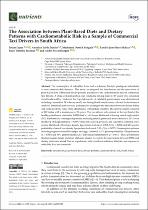| dc.contributor.author | Sekgala, Machoene Derrick | |
| dc.contributor.author | Lopes, Tatum | |
| dc.contributor.author | Zemlin, Annalise Edith | |
| dc.date.accessioned | 2024-01-26T07:36:29Z | |
| dc.date.available | 2024-01-26T07:36:29Z | |
| dc.date.issued | 2023 | |
| dc.identifier.citation | Lopes, T., Zemlin, A.E., Sekgala, M.D., Mchiza, Z.J.R., Erasmus, R.T. and Kengne, A.P., 2023. The Association between Plant-Based Diets and Dietary Patterns with Cardiometabolic Risk in a Sample of Commercial Taxi Drivers in South Africa. Nutrients, 15(7), p.1789. | en_US |
| dc.identifier.issn | 20726643 | |
| dc.identifier.uri | http://hdl.handle.net/10566/9269 | |
| dc.description.abstract | The consumption of unhealthy foods and a sedentary lifestyle predispose individuals to non-communicable diseases. This study investigated the distribution and the association of plant-based diets (PBDs) and dietary patterns in relation to the cardiometabolic risks in commercial taxi drivers. A cross-sectional analysis was conducted among males (19 years) who consumed street foods sold by vendors in the Cape Metropole. A validated questionnaire was administered, including a quantified 24 h dietary recall, and fasting blood samples were collected for biochemical analyses. Statistical analyses were performed to investigate the association between dietary habits and cardiometabolic risks, while adjusting for confounding variables. The analytic sample consisted of 189 males with a median age of 38 years. The taxi drivers who ranked in the top-third of the healthy plant-based diet index (hPDI) had a 1–4% lower likelihood of having raised triglycerides (TG). Furthermore, consumption patterns including refined grains and meat conferred a 33% lower likelihood of dysglycaemia (p = 0.049), while fish/seafood, potatoes, and vegetables conferred a 43% greater likelihood of low high-density lipoprotein cholesterol (HDL-C) (p = 0.026) and 44% greater probability of raised low-density lipoprotein cholesterol (LDL-C) (p = 0.027). Consumption patterns, including sugar-sweetened beverages and eggs, conferred a 37% greater probability of hypertension (p = 0.047) and 53% greater likelihood of subclinical inflammation (p = 0.017). These preliminary findings require larger and more elaborate studies to explore the associations between PBDs and dietary patterns in at-risk African populations, with or without sedentary lifestyles, and exposure to unhealthy food environments. | en_US |
| dc.language.iso | en | en_US |
| dc.publisher | MDPI Journal | en_US |
| dc.subject | Taxi drivers | en_US |
| dc.subject | Plant-based diets | en_US |
| dc.subject | Dietary patterns | en_US |
| dc.subject | Cardiometabolic risk | en_US |
| dc.subject | South Africa | en_US |
| dc.title | The association between plant-based diets and dietary patterns with cardiometabolic risk in a sample of commercial taxi drivers in South Africa | en_US |
| dc.type | Article | en_US |

